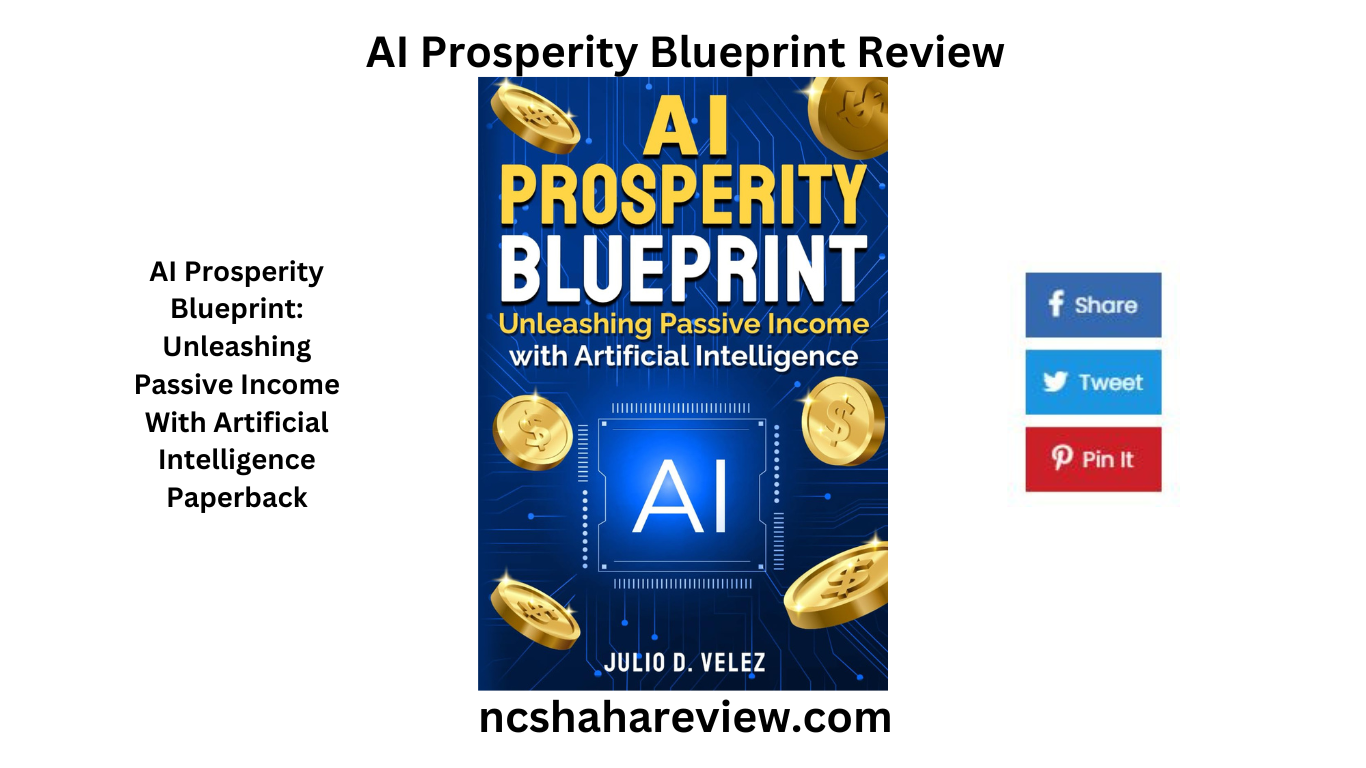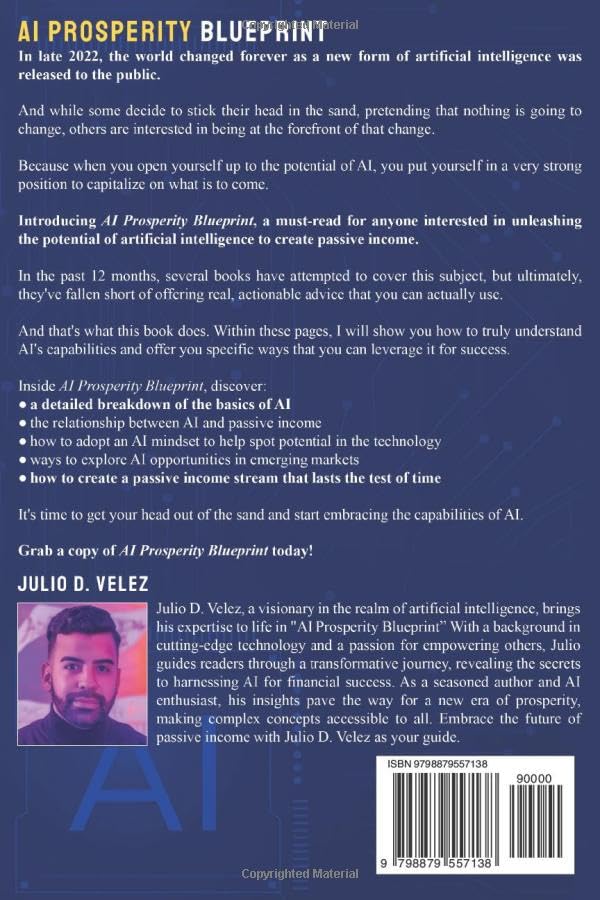Introduction
Ever wondered how you could make money while you sleep? Welcome to the world of passive income! Now, imagine combining this with the cutting-edge technology of artificial intelligence (AI). The AI Prosperity Blueprint is your gateway to understanding and leveraging AI for creating passive income streams. Whether you’re a seasoned investor or a curious beginner, this guide will walk you through the fascinating intersection of AI and passive income.
Understanding Passive Income
Before diving into AI, let’s clarify what passive income is. Passive income refers to earnings derived from an enterprise in which a person is not actively involved. Unlike a 9-to-5 job, passive income streams are typically set up once and continue to generate revenue with minimal ongoing effort. Traditional methods include rental income, dividends from stocks, and royalties from books or music.
The Role of AI in Generating Passive Income
Now, let’s explore AI. Artificial intelligence involves machines that can learn, reason, and act independently. It’s revolutionizing industries by automating tasks, analyzing data, and predicting trends. By harnessing AI, you can create passive income streams that were previously unimaginable.
AI-Driven Investment Strategies
Automated Trading Systems
Automated trading systems, also known as algorithmic trading, use AI to make trading decisions in real-time. These systems can analyze market data, execute trades, and even develop trading strategies based on historical data. This hands-off approach can generate significant returns with minimal effort.
Robo-Advisors
Robo-advisors are AI-driven platforms that offer financial advice and portfolio management. They use algorithms to create and manage a diversified portfolio based on your risk tolerance and investment goals. It’s like having a personal financial advisor available 24/7, ensuring your investments are optimized.
Predictive Analytics in Stock Market
Predictive analytics uses AI to forecast stock market trends. By analyzing vast amounts of data, AI can identify patterns and predict future movements. Investors can use these insights to make informed decisions and maximize their returns.
Creating AI-Powered Digital Products
Developing AI-Driven Apps
Creating an AI-driven app can be a lucrative venture. Whether it’s a chatbot, a personal assistant, or a recommendation engine, AI-powered apps can attract users and generate revenue through ads, subscriptions, or in-app purchases.
Monetizing AI Applications
Monetizing AI applications involves offering them as a service. For instance, AI algorithms can be used for image recognition, language translation, or sentiment analysis. Businesses can subscribe to these services, providing you with a steady stream of passive income.
Case Studies of Successful AI Products
Consider the success of apps like Siri or Alexa. These AI-driven products have not only revolutionized the tech industry but have also created significant revenue streams for their creators.
AI in Real Estate
AI-Powered Property Management
AI can streamline property management by automating tasks such as rent collection, maintenance requests, and tenant screening. This reduces the workload for property managers and increases efficiency.
Predictive Analytics for Real Estate Investments
AI can analyze market trends, property values, and economic indicators to predict the best times to buy or sell real estate. This data-driven approach helps investors make more informed decisions and maximize their returns.
Smart Home Technologies
Smart home technologies, powered by AI, enhance the appeal of rental properties. Features like AI-controlled lighting, heating, and security can attract higher-paying tenants and reduce vacancies.
AI in E-commerce
*AI for Personalized Shopping Experiences
AI algorithms can analyze customer behavior to provide personalized shopping experiences. By recommending products based on past purchases or browsing history, AI can increase sales and customer loyalty.
Chatbots for Customer Service
AI-powered chatbots can handle customer inquiries 24/7, improving customer service and freeing up human employees for more complex tasks. This leads to higher customer satisfaction and repeat business.
Inventory Management Automation
AI can optimize inventory management by predicting demand, managing stock levels, and automating reorders. This reduces costs and ensures products are always available when customers want them.
AI for Content Creation
Automated Content Generation
AI can generate high-quality content for blogs, social media, and marketing campaigns. This saves time and ensures a consistent output of engaging content, which can drive traffic and generate revenue through ads or sponsorships.
AI-Driven SEO Strategies
AI can analyze search engine algorithms and user behavior to develop effective SEO strategies. By optimizing your website for search engines, you can attract more visitors and increase your passive income from ads or affiliate marketing.
Personalizing Content for Audiences
AI can tailor content to individual preferences, increasing engagement and conversion rates. Personalized content is more likely to resonate with your audience and drive sales or subscriptions.
Leveraging AI for Marketing
AI in Email Marketing
AI can analyze customer data to create personalized email campaigns. By sending the right message to the right person at the right time, you can increase open rates, click-through rates, and conversions.
Predictive Analytics for Customer Behavior
AI can predict customer behavior, allowing you to anticipate their needs and preferences. This enables you to tailor your marketing efforts and increase customer retention.
AI-Driven Ad Campaigns
AI can optimize ad campaigns by analyzing performance data and making real-time adjustments. This ensures your ads are reaching the right audience and maximizing your return on investment.
AI in the Gig Economy
AI-Powered Freelance Platforms
Freelance platforms powered by AI can match freelancers with gigs that suit their skills and preferences. This increases job satisfaction and productivity, leading to higher earnings.
Matching Algorithms for Gigs
AI matching algorithms can connect freelancers with clients who need their specific skills. This reduces the time spent searching for work and increases the likelihood of landing high-paying gigs.
Enhancing Freelancer Productivity
AI tools can help freelancers manage their time, automate repetitive tasks, and stay organized. This boosts productivity and allows freelancers to take on more work, increasing their income.
Building an AI-Enhanced Online Course
Creating and Selling AI-Based Courses
Creating an online course that teaches AI skills can be a profitable venture. As AI continues to grow in popularity, more people are looking to learn about it, and they’re willing to pay for quality education.
Using AI for Personalized Learning Experiences
AI can personalize learning experiences by adapting content to each student’s needs and progress. This ensures students stay engaged and achieve better results, leading to positive reviews and more sales.
Marketing Your Course with AI
AI can help market your course by targeting potential students based on their interests and behavior. This increases enrollment and maximizes your revenue.
AI in the Health and Wellness Industry
*AI for Personalized Health Recommendations
AI can analyze health data to provide personalized health recommendations. This can be used to create subscription-based wellness services that offer tailored advice and support.
Automating Health Monitoring
AI-powered devices can continuously monitor health metrics such as heart rate, sleep patterns, and physical activity. These devices can alert users to potential health issues before they become serious, allowing for early intervention and better health outcomes. Subscriptions to these monitoring services can provide a steady stream of passive income.
AI-Driven Wellness Apps
AI-driven wellness apps offer personalized fitness and nutrition plans based on user data. These apps can adapt recommendations as users progress, providing a customized experience that keeps users engaged. Subscription models or in-app purchases can generate significant revenue.
Ethical Considerations and Challenges
Ethical Use of AI
As we embrace AI for passive income, it’s crucial to consider the ethical implications. AI should be used responsibly to avoid harm and ensure fairness. This includes being transparent about how AI is used and ensuring it doesn’t perpetuate biases.
Privacy Concerns
AI systems often require access to large amounts of data, which raises privacy concerns. It’s important to ensure that user data is collected and stored securely, and that users are informed about how their data will be used.
Addressing Biases in AI Algorithms
AI algorithms can unintentionally perpetuate existing biases present in the data they are trained on. Developers must actively work to identify and mitigate these biases to ensure fair and equitable outcomes.
Future Prospects of AI in Passive Income
Emerging Trends in AI
The field of AI is constantly evolving, with new trends and technologies emerging regularly. Staying informed about these developments can help you identify new opportunities for generating passive income.
Long-Term Potential of AI-Driven Passive Income Streams
The potential of AI to generate passive income is vast. As AI technology continues to advance, it will open up new avenues for earning and transform existing methods. By staying ahead of the curve, you can capitalize on these opportunities and secure a prosperous future.
Conclusion
The AI Prosperity Blueprint provides a comprehensive guide to leveraging AI for passive income. From investment strategies to digital product creation, real estate, e-commerce, content creation, marketing, and more, AI offers numerous ways to generate revenue with minimal ongoing effort. While there are ethical considerations and challenges to address, the potential rewards are substantial. By embracing AI, you can unlock new passive income streams and secure your financial future.
>>>As An Early Bird Click Here To Get AI Prosperity Blueprint Tools<<<
FAQs
1. What is passive income?
Passive income refers to earnings that require minimal effort to maintain, such as rental income, dividends, or royalties.
2. How can AI help in generating passive income?
AI can automate tasks, analyze data, and predict trends, creating opportunities for passive income in various fields like investment, e-commerce, real estate, and content creation.
3. Are there risks associated with AI-driven investments?
Yes, like any investment, AI-driven investments carry risks, including market volatility and the potential for biased algorithms. It’s important to research and choose reliable AI tools and platforms.
4. Can anyone create AI-powered products?
Yes, with the right knowledge and resources, anyone can develop AI-powered products. There are many tools and platforms available to help beginners get started.
5. What are the future prospects of AI in passive income?
The future prospects are promising, with continuous advancements in AI technology opening up new opportunities for generating passive income. Staying informed about emerging trends can help you capitalize on these opportunities.
Affiliate Disclaimer:
I will receive affiliate commissions for reviews and promotions on this website. Always provide my honest assessment, relevant experience, and sincere opinion about genuine goods and services. I want to be as helpful as possible to help you choose what to buy, your opinion, and your perspective. I am prepare to provide you with my particulars and insights, facilitating your ongoing investment at an appropriate level. However, before any acquisition , ensure thorough verification of the outcomes and metrics . By clicking on links or purchasing items offered on this website, you can financially support me through affiliate commissions. “It’s important for you to understand that I receive compensation upon your purchase.”


